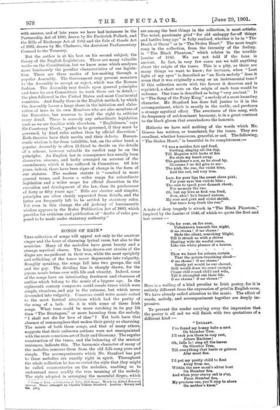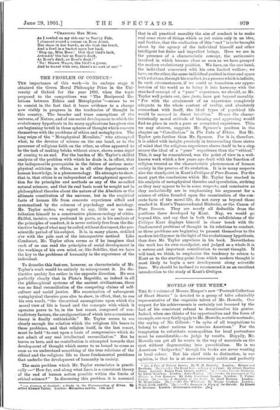SONGS OF ERIN.*
Tam collection of songs will appeal not only to the amateur singer and the lover of charming lyrical verse, but also to the musician. Many of the melodies have great beauty and a strange mystical charm. The long-drawn-out strains of the dirges are magnificent in their woe, while the most sprightly and rollicking of the tunes never degenerate into vulgarity. Roughly speaking, the songs fall into two groups, the sad and the gay. The dividing line is sharply drawn, for the joyous music brims over with life and vivacity. Indeed, some of the songs have an intoxicating freshness and clearness of outline which belong to the music of a bygone age. In the eighteenth century composers could create tunes which were simple, vivacious, and gay in the extreme, but which never descended into vulgarity. Cimarosa could write music suited to the most farcical situations which had the purity of the song of a lark. So it is with some of these Irish songs. What tune could be more catching in its gay lilt than "The Stratagem," or more haunting than the melody, "I shall not die for love of thee" ? Yet both have that absence of commonplace that makes their gaiety so charming. The music of both these songs, and that of many others, suggests that their unknown authors were not unacquainted with the more conscious art of Italy and Germany. The regular construction of the tunes, and the balancing of the musical sentences, indicate this. The harmonic character of many of the melodies removes them from the old folk-song pure and simple. The accompaniments which Mr. Stanford has put to these melodies are exactly right in spirit. Throughout the whole collection be has so varied the style that they might be called commentaries on the melodies, enabling us to understand more readily the true meaning of the melody. The style adopted in arranging the mournful dirges, which • Songs of Erin: a Collection of Fifty Folk Songs. Words by Alfred Pereeval Graves. linen arranged by Charles Villiers Stanford. London : Boosey and Co. Dit.1
are among the best things in the collection, is most artistic. The weird, passionate grief "for old unhappy far-off things and battles long ago" is fully realised, whether it be in "The Death of Oscar" or in "The Stolen Heart." The most tragic song in the collection, from the intensity of the feeling, is "The Black Phantom," which relates to the terrible famine of 1846. We are not told if the tune is ancient. In fact, in very few cases are we told anything about the origin of the tunes. This is a pity, as there are many things we want to know ; for instance, when "Lost light of my eyes" is described as "an Erris melody" does it mean that it was originally a song or an instrumental tune ? If this collection meets with the favour it deserves and is reprinted, a short note on the origin of each tune would be welcome. One tune is described as being "very ancient." It is "The Song of the Fairy King," a melody of a most haunting character. Mr. Stanford has done full justice to it in the accompaniment, which is mostly in the treble, and produces a strange mystical effect. The sweetness of this song, with its frequency of subdominant harmony, is in a great contrast to the black gloom that overshadows the laments.
Hitherto we have said nothing of the words which Mr. Graves has written, or translated, for the tunes. They are excellent, whether humorous, graceful, or sad. The following, "The Stolen Heart," is beautiful in its completeness :—
" I was a maiden fair and fond, Smiling, singing all the day,
Till Maguire with looks of fire He stole my heart away.
The gardener's son, as he stood by, Blossoms four did give to me : The pink, the rue, the violet blue, And the red, red rosy tree.
Lass, for your lips the sweet clove pink, For your eyes the violets blue ; The rose to speak your damask cheek, For memory the rue.
Oh, but my love at first was fond, Now, alas ! he's turned untrue, My rose and pink and violet shrink, Bat tears keep fresh the rue."
A note of deep tragedy is struck in "The Black Phantom," inspired by the famine of 1846, of which we quote the first and
last verses :— " On for ever, on for ever,
Unbeknown beneath the night, 0 nie chime ! 0 mo drama!
Stole the silent, searching blight, Till it struck us with a shiver Shaking wide its woeful curse, Like the white plumes of a hearse.
• • • - - - - - Then we knew for solemn certain That the poison-breathing cloud- () one chums! 0 mo ehuma!
Surely yet would be our shroud, Still would draw its cruel curtain Closer still round child and wife, Till it strangled out their life. 0 mo drama ! 0 mo Murata!"
Here is a wailing of a kind peculiar to Irish poetry, for it is entirely different from the expression of grief in English verse, We have already called attention to the music. The effect of words, melody, and accompaniment together are deeply im- pressive.
To prevent the reader carrying away the impression that the poetry is all sad we will finish with two quotations of a
different kind :— " Lintaar.
I've found my bonny babe a nest On Slumber Tree.
I'll rock you there to rosy rest, Astore Machree !
Oh, lulla lo! sing all the leaves On Slumber Tree, Till everything that hurts or grieves Afar must flee.
I'd put my pretty child to float Away from me,
Within the new moon's silver boat On Slumber Sea.
And when your starry sail is o'er, From Slumber Sea, My precious one, you'll step to shore On mother's knee."
"CHANGING HER MIND.
As I rowled-on. my side-car to Santry Fair,
I chanced round a corner on Rose Adair, Her shoes in her hands, as she took the track, And a fowl in a basket upon her back.
'Step up, Miss Rose ! Och that bird's luck, Attendin' the fair as Rose's duck, As Rose's duck, as Rose's duck !'
No! Shawn Magee, the bird's a goose, And to travel with two, there's no sort of use.'"





















































 Previous page
Previous page